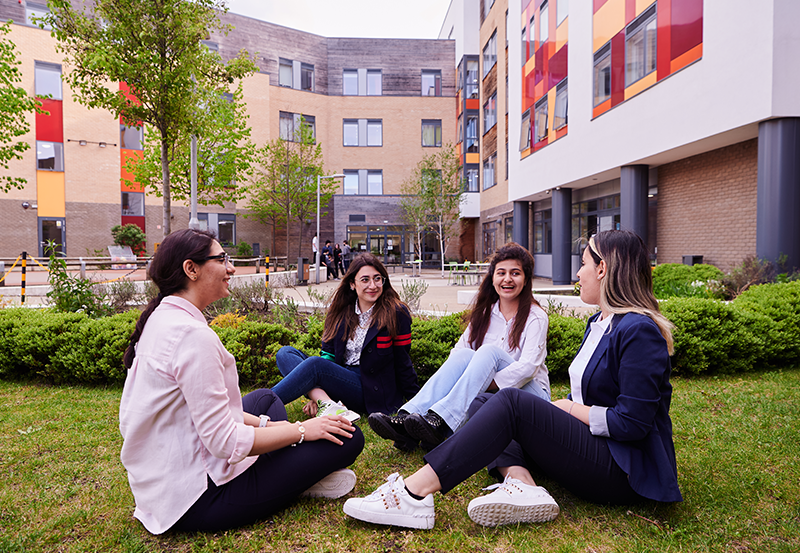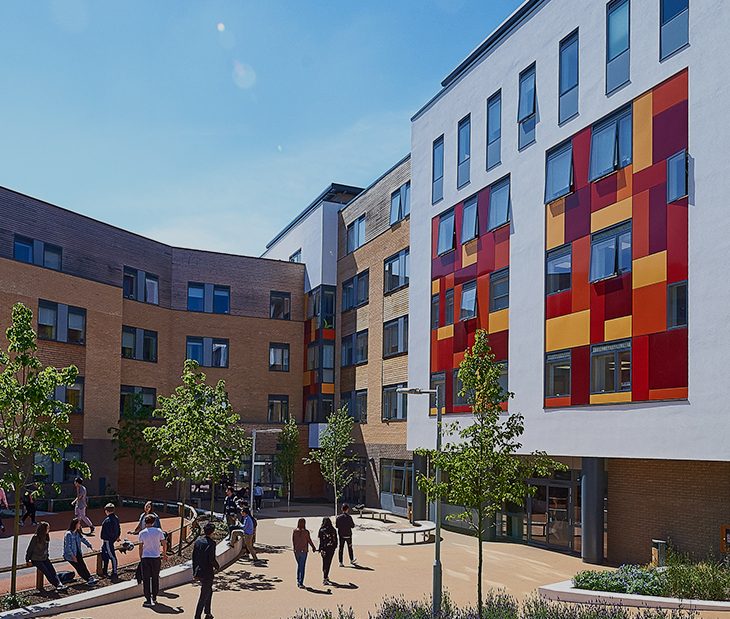Educational Journeys: A Comparison Between Switzerland and The UK’s Educations System.
21st August 24

For Swiss students eyeing the prospect of studying in the United Kingdom, understanding the nuances of both education systems is paramount. In this blog, we provide a comprehensive comparison between the Swiss and UK education systems, tailored specifically for Swiss students. Whether you’re weighing your options or already set on pursuing your studies in the UK, this blog aims to equip you with the knowledge needed to navigate the differences and make informed decisions.
School System in Switzerland
In the Swiss education system, a 2009 reform known as HarmoS aims to harmonise key elements across the 15 cantons* who approved the agreement such as the duration of mandatory schooling, fundamental curriculum components, and national achievement standards. However, despite these efforts towards harmonisation, a uniform or centralised system has yet to emerge.
The duration of compulsory education is outlined in the HarmoS agreement, spanning a total of 11 years. Primary education encompasses eight years, inclusive of two years dedicated to pre-primary education. Lower secondary education typically spans three years, although it can extend to four or five years in specific cantons. However, there has historically been some variability within cantons regarding the duration of upper secondary education. Most of the 15 cantons that have approved the HarmoS agreement offer a structure comprising two years of pre-primary education, followed by six years of primary education, and concluding with three years of lower secondary education.
*Note: Canton in Switzerland refers to the administrative divisions within the Swiss Confederation. Switzerland is divided into 26 cantons, each with its own government and constitution. These cantons have a significant degree of autonomy, with their laws, governments, and judicial systems. Examples of Swiss cantons include Zurich, Geneva, Bern, and Ticino. Each canton has unique characteristics, culture and traditions, contributing to Switzerland’s diverse national identity.
School System in the United Kingdom
In the United Kingdom, compulsory education spans 13 years, beginning with primary education at age 4 or 5 and continuing until age 16. Primary education is divided into Key Stage 1 (ages 4-7) and Key Stage 2 (ages 7-11). Students study core subjects such as English, mathematics, and science, with national assessments at the end of each key stage.
Secondary education starts at age 11 and includes Key Stage 3 (ages 11-14) and Key Stage 4 (ages 14-16). At the end of Key Stage 4, students take the General Certificate of Secondary Education (GCSE) exams in various subjects. These exams are essential for determining students’ next steps in their educational journey.
Post-16 education, while not compulsory, is commonly pursued and includes sixth form or college (ages 16-18), where students prepare for A-level exams or vocational qualifications. The UK education system maintains consistent standards through its structured curriculum and national assessments.
Pre-Primary Education in Switzerland
In Switzerland, pre-primary education is offered through Kindergärten / écoles enfantines / scuole dell’infanzia across all cantons. The implementation of the HarmoS reform, designed to standardise key elements of cantonal education systems, mandates a two-year pre-primary education for children, typically starting at ages four or five. While attendance used to be voluntary, most children still participated.

Pre-Primary Education in the United Kingdom
In the United Kingdom, pre-primary education is provided through nurseries, nursery schools, and reception classes across England, Scotland, Wales, and Northern Ireland. It typically begins at ages three or four. While attendance is not mandatory, it is strongly encouraged, and a significant majority of children participate. The focus of pre-primary education in the UK is to prepare children for the transition to primary school, emphasising social, emotional, and early academic development.
Primary Education in Switzerland
Following the introduction of HarmoS, primary school education has been standardised to six years, not including the mandatory two years of pre-primary education for cantons that have approved HarmoS. Previously, and still for cantons not part of HarmoS, primary education duration varied between four to six years, contingent upon the canton. However, primary school typically begins at age six (or seven in Graubünden). Students are not segregated by performance levels, and there is no formal certification granted upon primary education completion.
Primary Education in the United Kingdom
In the United Kingdom, primary education is standardised and spans six to seven years, beginning at age four or five. Children start in Reception at age four or five, followed by Key Stage 1 (Years 1 and 2) and Key Stage 2 (Years 3 to 6) in England and Wales.
During primary education, students are generally not segregated by performance levels, with the focus on providing a broad and balanced curriculum that includes English, mathematics, science, and other foundational subjects. At the end of Key Stage 2, students in England and Wales take standardised assessments (SATs), but these do not result in a formal certification. Instead, they are used to measure progress and attainment, informing the transition to secondary education.
British vs Swiss Education System Comparison Table
To provide a clear overview, the comparison table here highlights the key differences between the Swiss and British education systems.
| Education Stage | Swiss System | British System |
| Pre-Primary Education | Kindergärten / écoles enfantines / scuole dell’infanzia for 2 years (ages 4-6) | Pre-Primary (Early Years, ages 3-5) |
| Primary Education | 6 years of primary school (ages 6-12) | 6-7 years of primary school starting with Reception, followed by Key Stage 1 and 2 (ages 4-11) |
| Lower Secondary Education | 3-4 years of lower secondary (ages 12-15) | 3 years of Key Stage 3 (ages 11-14) |
| Upper Secondary Education | 3-4 years of upper secondary (ages 15-19), with options including academic Baccalaureate schools, vocational schools, and specialised schools | 2 years of Key Stage 4 (ages 14-16), leading to GCSE exams |
| Post-School Level | Various pathways including Federal and Cantonal Maturity certificate | 2 years of sixth form or college (ages 16-18), leading to A Levels, BTEC Nationals, or T Levels |
| Undergraduate Education | Bachelor’s Degree/Post Higher National Diplomas | Bachelor’s Degree |
The Abbey DLD Group of Colleges (ADLD) consists of three independent sixth form colleges located in Cambridge, London, and Manchester, offering a wide range of academic study programmes.
At Abbey DLD we strive to achieve the highest academic standards whilst providing a welcoming, safe, high-quality learning and boarding experience for students from around the world. Our aim is to help our students achieve the academic success needed to progress to the UK and the world’s top universities, whilst also developing the personal skills and qualities to succeed at university and beyond.
We offer GCSEs, BTECs, A Levels and International Foundation Programmes to give our British and International students access to UK and international universities.
Do you know?
While Swiss students complete 13 years of education, which aligns with the UK’s requirement, the curriculum and focus areas can differ significantly between the Swiss Matura and UK A Levels.
For Swiss students, applying to a UK university can present challenges due to the differences between the Swiss and UK education systems.
This difference can create a gap for Swiss students aspiring to study in the UK, especially at top universities, many of which have high entry requirements.
The International Foundation Programme (IFP) is specifically designed to address this gap. The IFP aligns with the second year of A Level study in the UK and equips Swiss students with the necessary academic preparation and qualifications to smoothly transition into UK degree programmes, ensuring they meet the required standards for university entry.

Secondary Education in Switzerland
Secondary education in Switzerland offers diverse pathways, with lower secondary education typically lasting three years in most cantons, except Ticino, which follows a four-year program. Student placement is influenced by academic performance and entrance assessments, with streaming options available in some regions. Upon completing lower secondary education, students do not receive a nationally recognised qualification, although some cantons issue school leaving certificates.
Upper secondary education provides options including academic Baccalaureate schools for university preparation, vocational schools for practical training, and specialised schools focusing on specific fields. The Maturity certificate, earned through examinations and continuous assessment, is essential for accessing higher education. Federal and Cantonal Maturity Certificates determine opportunities for further education and career prospects in Switzerland.
Secondary Education in the United Kingdom
Secondary education in the United Kingdom is divided into two main stages: Key Stage 3 (ages 11-14) and Key Stage 4 (ages 14-16).
Key Stage 3 (KS3): Lasts for three years, covering a broad curriculum including core subjects like English, Mathematics, and Science, along with additional subjects such as History, Geography and Modern Foreign Languages. Assessment is a mix of teacher evaluations and national tests.
Key Stage 4 (KS4): Spans two years, where students work towards General Certificates of Secondary Education (GCSEs) in various subjects. GCSE results are crucial for determining future educational and career paths.
Following this phase, between ages 16 and 18, students advance to Key Stage 5 and Level 3 Qualifications. Here, they pursue qualifications such as A Levels or vocational courses like BTECs. This stage serves as a transitional bridge, facilitating their progression into higher education or specialised fields. It’s akin to preparing for the next chapter beyond secondary school.

Do You know:
Every year Abbey DLD Students achieve outstanding results and move on to join some of the world’s most prestigious and highly-ranked universities. In 2023, 41% of our A Level students and 38% of our Foundation students progressed to Russell Group Universities, and 14 of our students progressed to study at Oxbridge Colleges or Medical School.
Blog Author

Peggy Lardot
Senior Regional Manager, UK & Europe, Abbey DLD Group of Colleges
E: Peggy.Lardot@abbeydld.co.uk
T: +44 (0)7585 308324
Get in touch today:
Since 1931, the Abbey DLD Group of Colleges has been synonymous with high-quality education, top university destinations, and enriching academic and pastoral experiences. Abbey DLD students graduate equipped with the skills to progress in their university studies and future careers, with friends from all around the world, and having made memories to remember for a lifetime.
Want to learn more about studying at the Abbey DLD Group of Colleges? Simply complete the form below and one of our admissions advisors will be in touch with you shortly.





